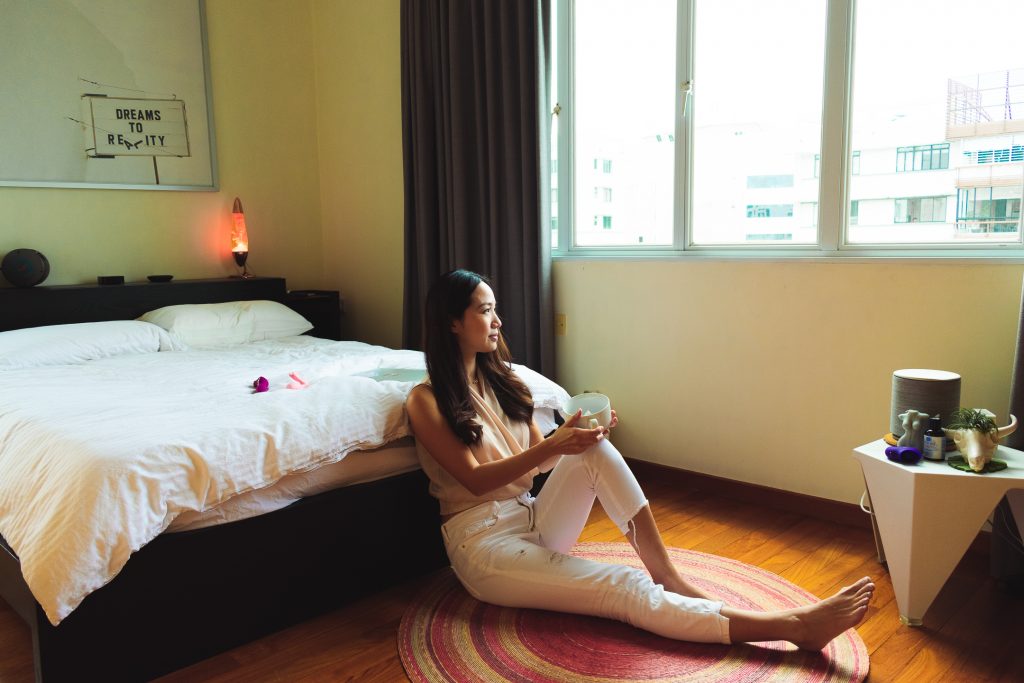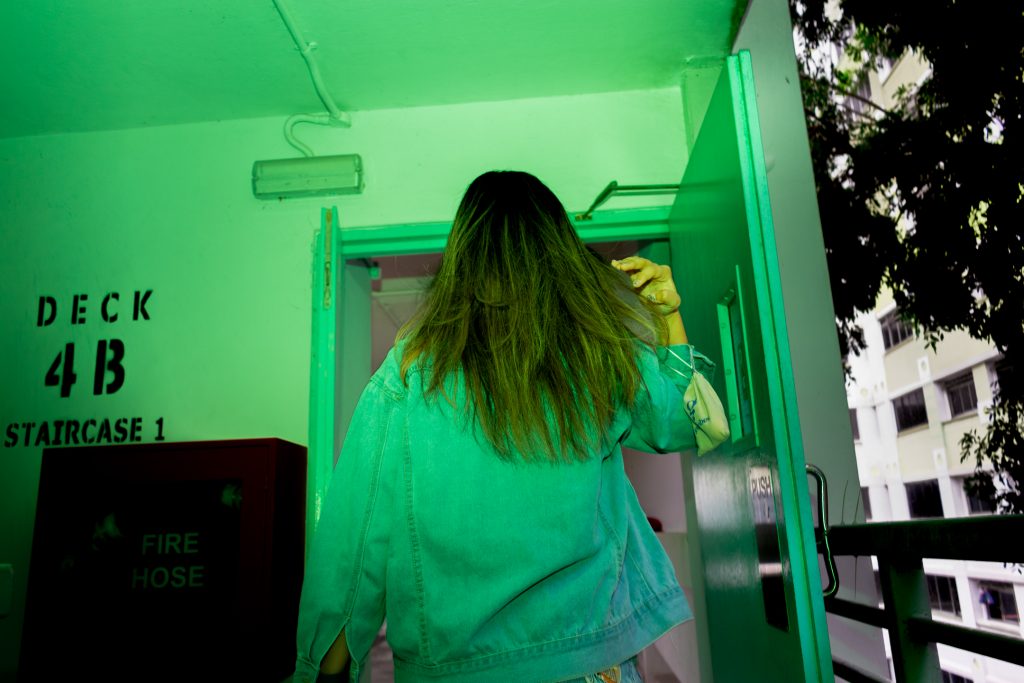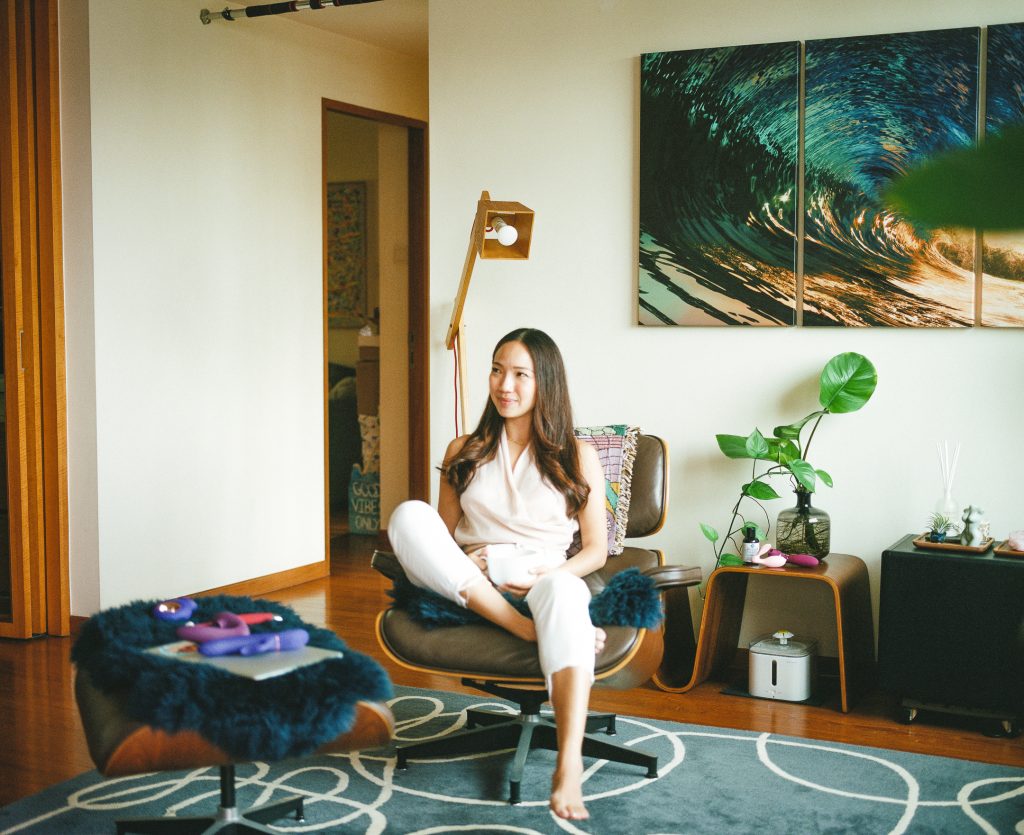These days, conversations about our bodies aren’t as taboo as they used to be. Even in conservative Asian cultures such as ours, we’ve shifted towards franker discussions of our relationship with sexuality and self. In our ‘Intimates’ series, we’d like to kickstart open conversations about the wellness of our private parts—in both the physical and psychological sense. Today, we talk about the role of faith and sex toys in finding oneself.
All photos by Riley Haagensen for RICE Media.
Women, especially those of certain religious faiths, should keep themselves pristine and pure for marriage. Or so we’ve been told.
But when “pristine and pure” becomes synonymous with “abstinence and chastity”, where does that leave women with functioning libido?
Sex after marriage? Perfectly normal. Sex before marriage? Dirty and a sin. Masturbation and sex toys? Erh, touchy subject. Interests in anything that has to do with the act of procreating without actually procreating? Absolutely unacceptable.
Denying women body autonomy might still be commonplace in the 21st century (much to our chagrin), but as religious minds are becoming more open, ladies like Jacqueline and Deena are taking back what is rightfully theirs.
Childlike Interest, Adultlike Disdain
Any kid would know the allure of cable television and of the American late-night dramas filled with content local television never would’ve dreamed of broadcasting in the ’90s. Compared to sanitised cartoons other tweens were watching, Jacqueline, then 12, found herself drawn to salacious ‘wrestling’ onscreen like a fish on a line.
But there’s much to be said about a young Christian girl with a keen interest in the steamy relations between two adults. Now 33, Jacqueline can still recall the look of horror her mother gave her, the faces of scorn upon her peers’ faces, whenever she uttered a dirty joke.

Having grown up in a Christian household and spent her formative years in a Catholic school, she was always told that girls had to be a certain way: Girls should wear their belts at their waists, girls shouldn’t stamp their feet, the list goes on.
There was also the old adage: According to the bible, sex outside of marriage is a sin in God’s eyes.
When conversations about a changing body’s new needs (thank you puberty) were pretty much non-existent, Jacqueline was made to feel she had to repress her curiosity and interest in sexual content.
“At some point, I felt really afraid to speak up about my wants and desires, or any of my sexual urges.”
And so she crossed her legs and kept her mouth shut. But, a rosebud kept in the dark is doomed to wither before it can bloom.
Out of Sight, Out of Mind
Though 9 years her junior, the lack of open channels Jacqueline experienced is not unfamiliar to Deena. Her pious Muslim parents heavily subscribed to the “out of sight, out of mind” mantra: if she doesn’t talk about sex, doesn’t think about sex, she wouldn’t have sex, thereby she wouldn’t be doing anything wrong.
“It was a way to instil the idea that everything related to sex is wrong and forbidden because of religion, but they never explained why. It was just because.”
Religious studies played a part too. While Deena enjoyed attending weekend madrasahs during her Primary school years, she recalls a radical shift in the curriculum the year she turned 13. No longer were classes mainly about the Qur’an and its teachings, but instead, fear-based basic sex ed 2.0. Just as it was taught in secular schools, the same was taught in madrasah classes: sex = shameful.
It made dating difficult for her. Deena was never really able to fully focus on her relationship or her boyfriend. Her mum once chewed her out for texting a male friend (a boyfriend, really) and questioned how far the pair had gone, before launching into a spiel about how such a relationship was, again, wrong.

Wrong, Wrong, Wrong
To reference Shylock’s monologue, to be human is to laugh when tickled, to bleed when pricked, to die when poisoned. Is it not only human to get off when aroused?
Religious doctrines combined with Singapore’s conservative Asian culture meant teachings like “sex is sacred, you must save it for marriage”, “girls should be pure and demure”, and “sex is forbidden, dirty and wrong”.
The effects of such strict conservative upbringings aren’t always immediate. When natural curiosity and emotions are deemed to go against the core of one’s faith, individuals end up believing the root of the problem lies within themselves, that they are what’s wrong. If they felt that they could not do right by the religion, then they’d be lesser in the eyes of their god.
Their environment’s need to nip what was perceived as a problem in the bud led to deeply rooted psychological insecurities that ultimately eroded away their perception of self-worth.

Both Deena and Jacqueline walked what should’ve been a colourful intimate journey shrouded in misery. The colours that constitute pleasure — splashes of orange associated with excitement, red with pleasure, blue with curiosity — became marred with streaks of grey: of shame and of guilt.
The simple act of getting off was never without shame rearing its head from the back of their minds.
“[Getting off] was a very simple thing but I felt so ashamed. I was like, I know this is wrong, I shouldn’t be doing something so unrighteous. I shouldn’t even be thinking of it,” Deena shared.
“The voices in the back of my head kept telling me ‘This is wrong’, ‘You’re always wrong’ because I was curious.”
Similar words echoed in Jacqueline’s head throughout youth. Her self-doubt manifested so strongly that when she received her first sex toy as a gift from a friend, she thought she was broken when it didn’t do anything to add to her experience. And if a sex toy couldn’t make getting off feel better, then perhaps there really was something wrong with her wanting more.
Jacqueline was made to believe that pleasure was never hers to own. When caught up playing the subservient role (for men and for God), the self is never a priority.

Having a Cake and Eating It
Years passed before these ladies understood they weren’t some random alien specimen with an unnatural libido, and that it was possible to love themselves without having to abandon their faiths.
Epiphany came in the form of sex toys for Jacqueline. Blessed with a safe space and having accepted herself as more spiritual than strictly religious, she and her husband (then-boyfriend) experimented with different types of sex toys. It was only then, for the first time, she felt that she could finally be herself without holding back.
“The experience really unlocked something in me,” she recalls. “All those repressed feelings about pleasure never being mine to own just went out the door. Just the idea that I can acquaint myself with different types of toys and make sure that pleasure was something that I could take into priority changed me.”

She shows us an arsenal of toys she’d stashed in the different rooms. Some are her own, some are part of the lineup for her sexual wellness business, HEDONIST. Her collection ranges from more subtle-looking ones — so inconspicuous you could leave them on display in the living room and no one would bat an eyelid — like the Luxe Love the Rabbit, to other heavy-duty beasts like the Godiva Rabbit Thruster.
Now married, the toys are like the seasoning on fries to their relationship: to spice things up, if they want to.
“Our intimacy is built a lot on trust and communication, and that’s what makes the orgasm something else. Sex toys enhance it and take it to the next level, and I love that it’s an option during our intimate session.”
Meanwhile, it took a harsh break-up for Deena to realise she had, all her life, been far too harsh with herself. The religion-driven doctrines she built herself upon were also the same millstones around her neck.
“Taking a step back from the emotions I felt made me question how I saw myself as a person. Simply put, I didn’t.”

The unlearning process allowed her to finally embrace herself as a whole person, to accept the flaws, wants, needs, quirks that made her who she was. Deena’s since moved on to advocating for sexual wellness for other women and has even given sex toys a try.
“The first time I held one in my hand and felt it vibrate was so exciting. It’s funny how back then I’d get that punishing feeling when I think about anything sexual, but it’s like I’m a grown woman now. Like, oh my god, I’m growing” she gushed.
She describes her experience with her first toy, Good Vibes’s Koi clitoral massager, as an eye-opening one.
“You discover certain body parts that you didn’t know were there, and then you realise oh shit, they’re there for a reason.”

Freed from the weight of their religious guilt, intimacy became something special for these women. By finding the intersection between self-love and selflessness, self-pleasure also became something as normal as water. Drink when thirsty, because the body needs it.
Sex remains something Deena considers sacred and not something she takes lightly, but she doesn’t deny herself of her urges. More than anything, masturbation, especially with a sex toy, is a way for her to explore her body in a healthy manner without having to compromise on her beliefs. No longer victimised by the shame she was once instilled with, her relationship with faith improved too.
Jacqueline puts it bluntly: “If anyone tries to tell you you’re going to hell for self-pleasure, just know what whatever you’re feeling, 99 per cent of the population is experiencing it too. It’s not something you have to feel bad for, don’t let them guilt you.
“God put you in this place for a reason. Life is too short to restrict new experiences, you’ve just got to live your best life.”
God and Yourself
Though religious groups are not allowed to dictate, regulate or shape public morality in Singapore, moral regulation has been more or less influenced by various religious ideals. The acceptance of such initiatives lies in the close moral fit between such groups and the values promoted by the state.
It’s a pragmatic approach. Nation-building in such a tiny country as Singapore relies on pro-natalist policies, and these policies define the traditional family as the building block of society. By upholding traditional family values and conservative expressions of sexuality on a national level, it’s not surprising that religious doctrines get that additional boost up.
Unfortunately, we’ve become so caught up in enforcing what we deem as ‘morally right’ that we might have neglected the simple fact that women are humans with human needs. In an environment where the ability to express ourselves without judgement is taken for granted, we forget the simple act of talking freely about sexual health can be therapeutic, healing.
It’s only when we talk more about it will more women realise it’s not a black and white divide between faith and pleasure. Destigmatise the topic of sex, and maybe women wouldn’t have to second-guess themselves for being less in the eyes of their religion simply for being human.
After all, there’s nothing wrong with loving both your god and yourself.






